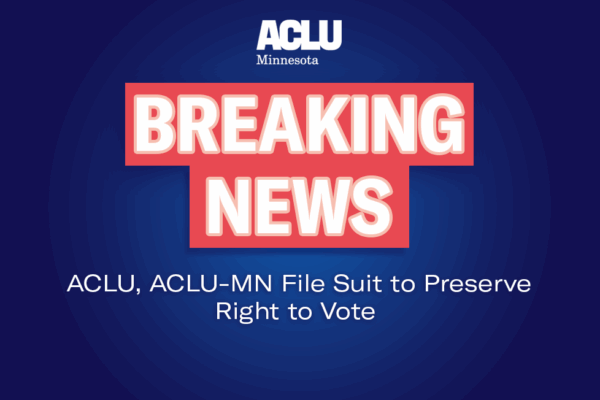SAINT PAUL — The ACLU of Minnesota and national ACLU today argued a major voting rights case before the Minnesota Supreme Court.
The ACLU challenged the State’s disenfranchisement practices, which prohibit more than 53,000 Minnesotans from voting while on felony probation even though they are living, working, paying taxes, worshipping, and raising families in our communities. These Minnesotans are disproportionately Black, Indigenous, people of color (BIPOC). The lawsuit, Schroeder v. Minnesota Secretary of State, was filed by the ACLU-MN, national ACLU and pro bono attorneys at Faegre Drinker on behalf of plaintiffs disenfranchised by the state’s practice and seeks a court order that allows all impacted Minnesotans to vote.
“It is time for our state’s highest court to address the use of our criminal legal system to perpetuate systemic racial inequality,” said ACLU-MN staff attorney David McKinney. “The practice of disproportionately disenfranchising persons of color is an egregious example that the Supreme Court has a historic opportunity today to fix.”
“As voting rights come under attack across our nation, we need the Minnesota Supreme Court to exercise its constitutional responsibility to protect the right to vote,” said Craig Coleman, a partner with Faegre Drinker, pro bono co-counsel on the case.
The state prohibits people on felony supervision or probation from voting, even after they have finished any prison term or even if they’ve never spent a day in prison.
Plaintiff Jen Schroeder was sentenced to 40 years of probation for a drug possession charge, and cannot vote until she is 71. She became a drug and alcohol addiction counselor and is now a stay-at-home mom.
“I am dedicated to making a difference in the lives of others,” said Schroeder, who worked with state lawmakers to cap probation and fought for voting rights. “I should have the right to vote for candidates who I think will make policy changes that help me be successful. There’s absolutely no reason to strip people on probation of our right to participate in our democracy.”
Julie Ebenstein, senior staff attorney with the ACLU’s Voting Rights Project, added, “Our clients and thousands of other Minnesotans contribute so much to their communities. Depriving them of the fundamental right to vote is as cruel as it is unconstitutional.”
The complaint cites due process and equal protection violations under the state Constitution.
Learn more at: https://www.aclu-mn.org/en/cases/schroeder-v-mn-secretary-state
The American Civil Liberties Union of Minnesota is a nonpartisan, nonprofit organization that promotes, protects, and extends the civil liberties and civil rights of people in Minnesota through litigation, lobbying, and community engagement.
###
Speakers:
- ACLU-MN staff attorney David McKinney
- Craig Coleman, a partner with Faegre Drinker, pro bono co-counsel on the case
- Plaintiff Jen Schroeder, a former drug and alcohol addiction counselor and leading voice for capping probation and expanding voting rights
- Plaintiff Elizer Darris, co-executive director of the Minnesota Freedom Fund and board member of the State Board of Public Defense
- Ramsey County Prosecutor John Choi
ACLU-MN Voting Rights Fact Sheet
Disenfranchisement disproportionally affects people of color.*
- Black Americans comprise about 4% of Minnesota’s voting-age population, but they account for more than 20% of these disenfranchised voters living in the community.
- American Indians make up less than 1% of Minnesota’s voting-age population but comprise almost 7% of those disenfranchised.
- Latinx people make up less than 2.5% of Minnesota’s voting-age population but comprise almost 6% of those disenfranchised.
Disenfranchisement hits Greater Minnesota the hardest. **
- Every Minnesota county contains people who cannot vote while on probation.
- About 70% live outside Hennepin and Ramsey Counties.
- Probation lengths in Greater Minnesota are on average 46% longer.
Minnesota has one of the nation’s highest rates for people on probation or supervision, which means more people are prohibited from voting. ***
- In 2016, one in 41 Minnesota adults was on probation or parole, making it the state with the seventh-highest supervised population in the country on a per-capita basis.
The number of offenses considered felonies has exploded in Minnesota, which means more people cannot vote. ****
- The number of crimes defined as felonies has vastly increased. In the mid-1800s, there were less than 100 felony-level crimes in Minnesota. Today, that number is close to 400.
- Many more low-level and nonviolent crimes are now classified as felonies.
Barring people from voting while they’re on probation or supervision does not work because it:
- Undermines rehabilitation.
- Increases recidivism.
- Alienates individuals from their communities.
- Fails to achieve any deterrent effect.
Letting people vote while they’re on probation helps people, communities, and families because:
- Individuals who vote tend to be more active in their communities.
- Voting connects people to their communities and reduces recidivism.
- Children are more likely to vote as adults if they are raised by parents who vote.
Sources:
*U.S. Census and the Minnesota Department of Corrections pursuant to a Minnesota Government Data Practices Act request
**Minnesota Justice Research Center, Felon Disenfranchisement in Minnesota, Feb. 21, 2019
*** Pew Charitable Trusts, Probation and Parole Systems Marked by High Stakes, Missed Opportunities, Sept. 2018
**** Mark Haase, Civil Death in Modern Times: Reconsidering Felony Disenfranchisement in Minnesota, Minnesota Law Review, Sept. 1, 2015; Minn. Sentencing Guidelines and Commentary 96-123 (Aug. 1, 2014); and Minnesota Statutes
Related Content

ACLU-MN RESPONDS TO SUPREME COURT RULING AGAINST RESTORING VOTING RIGHTS TO MINNESOTANS
Stay Informed
Sign up to be the first to hear about how to take action.
By completing this form, I agree to receive occasional emails per the terms of the ACLU’s privacy statement.
By completing this form, I agree to receive occasional emails per the terms of the ACLU’s privacy statement.


